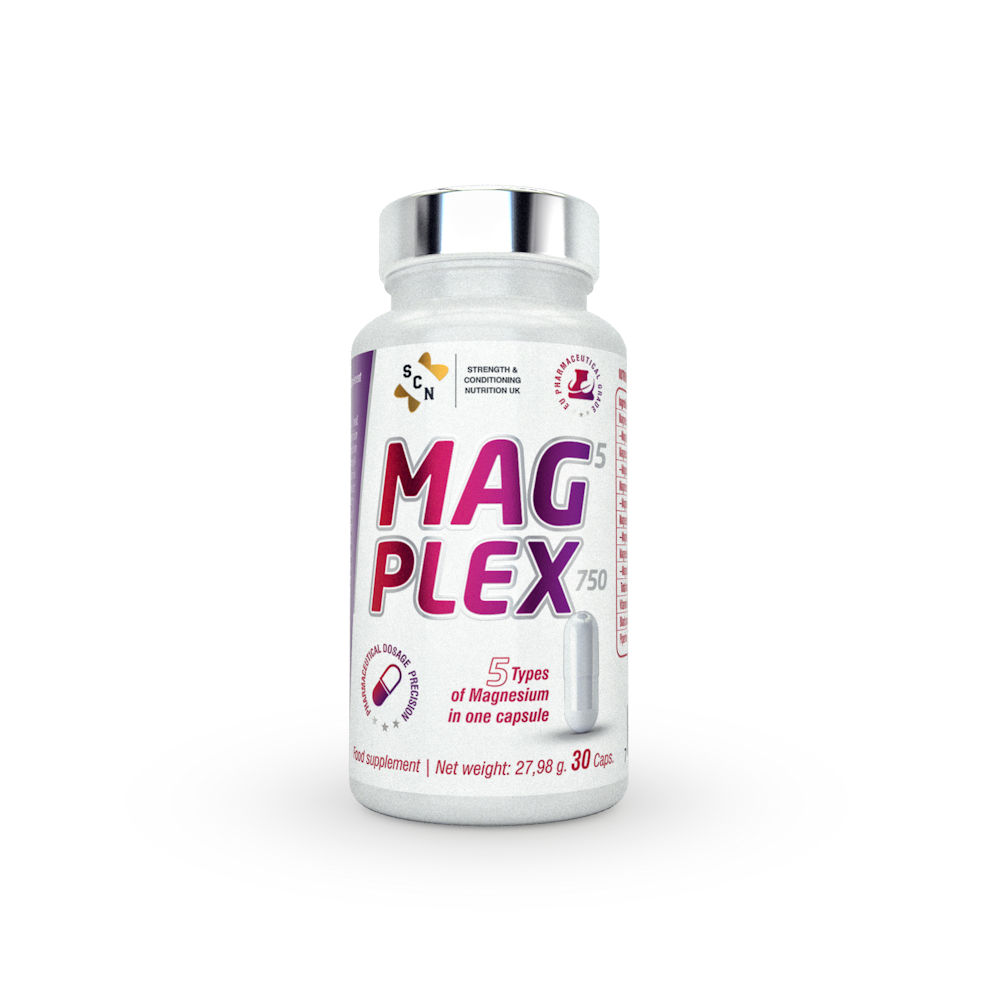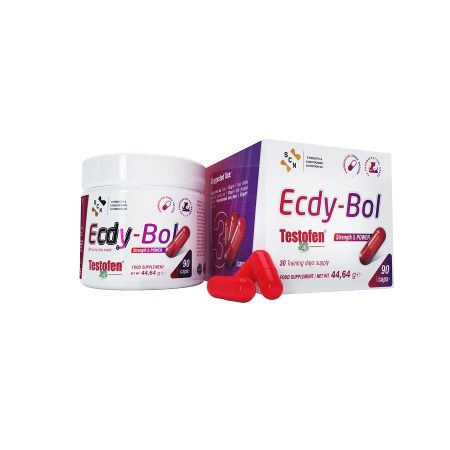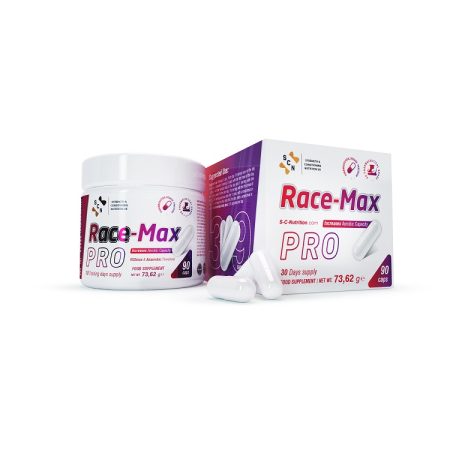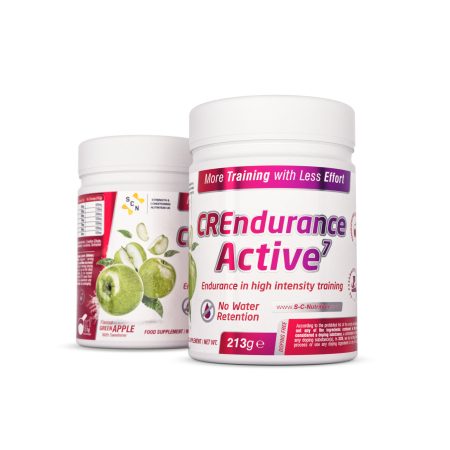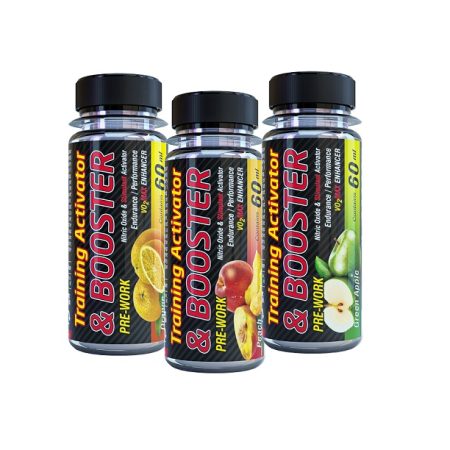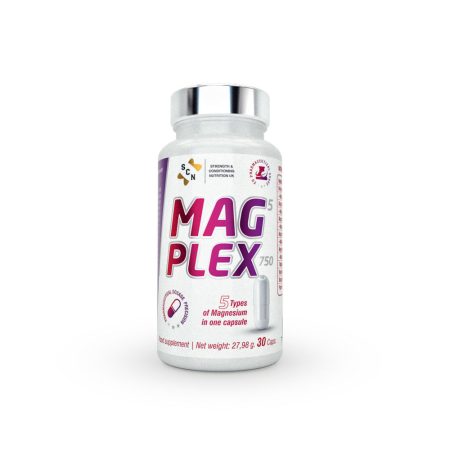Description
Mag5Plex750 Multi-Magnesium Complex
5 types of magnesium in 1 capsule
One unique health & sport formula provided to you by SCN.
The only magnesium supplement on the market with 5 types of magnesium, P5’P and Bioperine.
Not all types of magnesium are the same
There are many differences between different types of Magnesium.
Each one had different absorption, different elemental magnesium content and different properties when it comes into the body
Why Mag5Plex750 ?
Mag5Plex750 is a unique formula designed to provide all the magnesium properties to you together with all the properties of the 5 different bonds it carries.
Our formula combines the highest absorbed types of magnesium, each with several properties, so you are spherically benefitted by this massive 750mg magnesium concentration.
Benefits of Mag5Plex750
Details about Magnesium:
Magnesium is one of those supplements that is very well known for its benefits throughout the natural health community. Magnesium is involved in over 300 biochemical processes in the body. One of its most important functions is that it plays a key role is producing energy, this makes it vitality important for all cellular functions and processes. It helps maintain normal muscle and nerve function, keeps heart rhythm regular, supports a healthy immune system, and keeps bones strong. Its wide range of health benefits and biological activity make it effective in addressing a number of common diseases and conditions including fibromyalgia, chronic pain, diabetes, osteoporosis, cardiovascular disease and headaches. Numerous studies have demonstrated that magnesium supplementation and correction of deficiency has improved the aforementioned conditions. The problem with this essential mineral is that most people do not have sufficient levels for optimal health. A gradual depletion of nutrients from our soils has left many vegetables with lower levels of magnesium. Another factor that contributes to magnesium deficiency is that it often is depleted by various common conditions (i.e. IBS, Crohn’s disease) and medications (i.e. proton pump inhibitors, diuretics).
Here’s how magnesium plays a role in maintaining good health:
- Nucleic acid synthesis: Virtually all body tissues undergo turnover, meaning new cells replace old ones. Cell replication requires the synthesis of nucleic acids (DNA and RNA). Magnesium is essential to this process. It also stabilizes the new genetic material and participates in repairing nucleic acid damage.
- Protein synthesis: Magnesium-dependent processes enable your body to make the proteins it needs. This supports cell turnover as well as the production of antibodies, hormones and transport proteins, such as fat-carrying lipoproteins in your bloodstream and oxygen-carrying heme in your red blood cells.
- Nerve signaling: Magnesium helps control the conduction of nerve cell impulses. A defiency makes nerves “irritable,” which can lead to symptoms such as numbness or tingling. Seizures can occur with severe magnesium deficiency.
- Muscle contractions: The balance of calcium and magnesium is key to normal contractions of both your voluntary and involuntary muscles. Magnesium deficiency can causes muscle-related symptoms such as weakness, twitching and cramps. It can also cause heart rhythm abnormalities.
- Strong bones: Approximately 60 percent of the magnesium in your body resides in your bones, primarily as crystals that impart bone strength. If a magnesium deficiency occurs, the body mobilizes bone magnesium to counter the shortfall in the rest of the body. Over time, this leads to weakened bones and contributes to osteoporosis.
The Benefits of Magnesium Supplements for Athletes and Exercising
About 25 grams of the magnesium mineral is normally present in the human body. Around 60% of this can be found in the bones while the remainder is within the body’s cellular structure.
It is a necessary mineral as it supports the production of energy as well as the maintenance of healthy cells.
It also enables the body’s muscles to recover quickly from stress and fatigue so that the muscles can contract and relax properly.
The Role of Magnesium in Sports
Magnesium is especially required by athletes as their daily activities involve strength training and muscle development.
They need to have a high endurance to carry out strenuous tasks and being able to recover from such vigorous activities is critical for optimum training and performance.
For this reason, there should always be a sufficient supply of magnesium.
If there is a deficiency in magnesium that cannot be addressed through good nutrition and diet then it may necessary to consider taking magnesium supplements.
The Importance of Magnesium Supplements
As one sweats and urinates often when engaged in a physical activity, the magnesium level inside the body can get depleted.
This can prove to be dangerous, especially for athletes, as it can cause dizziness, high blood pressure and nausea, among others.
Even low level deficiencies are believe to have an impact on performance and ability to recover from heavy training.
Daily recommended dosages may be high for athletes and sports enthusiasts.
Factors that Inhibit Magnesium Absorption
If you want to maximize the efficiency of your magnesium intake, then you should be aware of factors that can reduce its absorption.
Too much protein in the diet is one of the causes of inefficient absorption of this mineral (but also too little protein in the system can have a similar effect).
Alcohol also can interfere with the mechanism by which the body absorbs magnesium so (as is always recommended on health related websites) consider reducing your intake of alcohol if you are concerned about your health and sport performance.
Magnesium Deficiency
When the body’s magnesium level falls beyond the minimum requirement, a person may feel tired and lethargic.
Engaging in strenuous physical activities like sports and exercise can also deplete the body of said mineral as it is excreted in the form of sweat.
Many who are particularly conscious of their nutritional intake look to sports drinks to assist providing their daily requirement of necessary minerals.
But please be aware that only a few sports drinks contain magnesium and always check the label before purchasing if this is important to you.
Benefits of Magnesium Supplements for Sporting Performance
It is only natural for a person to sweat a lot when engaged in sports and other similar activities.
However, one needs to maintain the proper levels of magnesium in the system in order to carry out this active lifestyle without posing any risks to one’s health.
In addition, there is some research evidence that indicates that taking magnesium may improve performance, particularly for those who are competing in endurance type events.
Aside from eating food sources that are rich in magnesium, sports-minded people can also take in dietary supplements to ensure adequate supply.
Adding magnesium supplements to your everyday nutritional program will ensure that your body is supplied with sufficient to perform vigorous activities.
The mineral is also needed by the body to recuperate from fatigue and exhaustion properly, so that muscle cramps and other similar problems can be avoided.
Magnesium citrate
Citrate might sound familiar too—consider it an erudite way of saying that it’s derived from citric acid (in this case, magnesium salt is obtained from the citrus acid). With excellent bioavailability—that is, the efficacy with which a substance is absorbed and used by the body—it’s no wonder magnesium citrate one of the most highly recommended magnesium supplements by health professionals.
Often used to naturally support digestion—specifically, to alleviate constipation and acid indigestion—it’s also, bonus points, easy on the wallet.
Magnesium Malate – Energy & Sport Performance
The health benefits of magnesium malate derive from the magnesium content. So, the malate just functions as the mineral carrier and helps the intestines absorb the magnesium better.
Magnesium supplements like magnesium malate confer several potential health benefits. It serves as an essential cofactor in more than 600 metabolic reactions involved in a broad array of biological functions, such as regulating your energy and making protein, as reported in a January 2015 Physiological Reviews article. It is also essential for healthy bones, muscles and nerves. Think of magnesium as a biochemical multi-tasker.
Malic acid (Magnesium Malate = Magnesium + Malic Acid) is also used to boost sports performance when taken in supplement form. It is sometimes combined with creatine supplements in order to improve the body’s absorption of creatine. Proponents claim that malic acid can promote energy production, increase exercise endurance, and help fight off muscle fatigue.
Magnesium Bisglycinate – The calming magnesium
Feeling stressed? This may be the form for you. While magnesium in its many different forms has been shown to naturally support muscle relaxation, magnesium bisglycinate might just take the cake (to note: the amino acid bisglycine is known for the calming impact it can have on the mind and body).
Additionally, it has optimum bioavailability and, unlike some of its kind, isn’t known for its laxative properties.
Magnesium Gluconate
Corrects Deficiency
Low dietary intake may not be the only cause of magnesium deficiency; health conditions can necessitate supplements. Magnesium gluconate can restore magnesium when drugs such as diuretics, antibiotics and medications for cancer treatment may impair absorption of nutrients. Crohn’s disease, gluten sensitivity and intestinal surgery may cause reduced absorption of nutrients and loss of magnesium through diarrhea. Alcoholics commonly suffer from low blood levels of magnesium and magnesium gluconate can restore the levels to normal. Ability to absorb magnesium decreases with age and seniors are more likely to take drugs that interact with magnesium. Magnesium supplements may help with these imbalances.
Antacid and Laxative
As a supplement, magnesium gluconate has the best bio-availability of all magnesium supplements. Used as an antacid, it reacts with stomach acid to increases gastric pH for relief of indigestion and heartburn. Magnesium gluconate may be used as an electrolyte replacement and laxative. In large doses, magnesium gluconate taken as an antacid or laxative can lead to elevated levels of magnesium. Mobey’s Medical Dictionary gives a high-alert drug warning for pregnant women taking magnesium gluconate. The supplement can create an osmosis effect by drawing water into intestines and causing distension and diarrhea.
Cardiovascular Benefits
Supplements of magnesium gluconate may help regulate normal blood pressure, preventing hypertension and cardiovascular disorders. The “American Journal of Clinical Nutrition” reported the results of The Honolulu Heart Study stating magnesium had a strong association with blood pressure, although it was difficult to separate the exact effects from other variables.
Magnesium L-Pidolate
Prevention of dehydration
Prevention of erythrocyte dehydration by specific blockade of the transport pathways promoting loss of potassium (K) is a potential therapeutic strategy for sickle cell (SS) disease. Dietary magnesium (Mg) pidolate supplementation over a 4-week period has been shown to inhibit K-Cl co-transport and reduce dehydration. We report here the results in 17 of 20 patients with SS disease treated in an open-label unblinded study of the effects of long-term (6 months) oral Mg pidolate administration (540 mg Mg/d). A significant decrease (P < 0.0025) was observed with Mg therapy in the distribution widths for red cell mean cell haemoglobin concentration (MCHC) (haemoglobin distribution width; HDW), reticulocyte mean cell volume (red cell distribution width of reticulocytes; RDWr) and MCHC (reticulocyte HDW; HDWr), activity of red cell K-Cl co-transport, Na/Mg exchanger and Ca2+-activated (Gardos) K+ channel, whereas red cell K and Mg contents were significantly increased. Hb levels and absolute reticulocyte counts did not change with Mg therapy. Two patients did not complete the trial because of diarrhoea and one did not complete the trial for unrelated reasons. Although the median number of painful days in a 6-month period decreased from 15 (range 0-60) in the year before the trial to 1 (range 0-18; P < 0.0005) during the period of Mg therapy, no firm conclusion on therapeutic efficacy could be drawn from this unblinded open-label trial.
Magnesium Pidolate and Brain Penetration
Magnesium Pidolate and Headache: A Challenge for the Future
Pyridoxal 5′ Phosphate:
Vitamin B6 and Its Role in Athletic Performance
Research has uncovered many important discoveries in regard to athletes, nutrition and vitamins in the past decade alone.
While athletes typify a certain fitness ideal, many of them straddle a fine line between being in great shape, poor eating habits and being vitamin deficient.
This is particularly true in regard to the “B vitamins.”
In a summary article appearing in Science Daily (December 27, 2006)[i],[ii] based on research by the University of Oregon and entitled: “Poor Athletic Performance Linked To Vitamin Deficiency,” the authors found:
“Active individuals lacking in B-vitamins — including college athletes and other elite competitors — may perform worse during high-intensity exercise and have a decreased ability to repair and build muscle than counterparts with nutrient-rich diets, a new study concludes.”
The University of Oregon Study again confirmed research[iii] conducted in 1991 by van der Beek that found:
“Vitamin deficiencies can certainly impair exercise performance. A daily intake of less than one-third of the RDA for several of the B vitamins (B1, B2 and B6) and vitamin C, even when other vitamins are supplemented in the diet, may lead to a significant decrease in VO2max and the anaerobic threshold in less than four weeks.”
Vitamin B6 Function: The Winning Attitude
As athletes burn greater amounts of calories, hydrate to a greater degree and subsequently sweat and urinate fluids, water soluble vitamins such as vitamin B6 leave the body.
Of the B vitamins, unlike B12 or B1, (Pyridoxine) vitamin B6 function’s are not as widely known and yet vitamin B6 supplementation may play a particularly significant role in athletic performance and even the “performance mentality” of athletes. Although most references to vitamin B6 function tell us that in normal diets B6 deficiencies are rare, in athletes where diets are limited and large amounts of calories are burned, deficiencies in the amount and functions of vitamin B6 may be present and thus require a vitamin B6 supplement.
For example, the National Institutes of Health Guidelines (reviewed September 15, 2011), point to Vitamin B6 supplement deficiencies as leading to: “…anemia, itchy rashes…depression, confusion, and a weak immune system.”
As quoted in Everyday Health, an online publication, Nutritionist Dee Sandquist, MS, RD, CD, a spokesperson for the American Dietetic Association states that the function of vitamin B6: “Is important for cardiovascular, digestive, immune, muscular, and nervous system function. The B6 vitamin is needed for proper brain development and function and to make the hormones serotonin and norepinephrine, which affect mood…”
Numerous articles have been written about depression in athletes. In a 2013 study reported in the prestigious Clinical Journal of Sport Medicine[iv] entitled: “The prevalence of failure-based depression among elite athletes,” swimmers (not hockey or football players) were tested for depression. The study concluded:
“The findings suggest that the prevalence of depression among elite athletes is higher than what has been previously reported in the literature. Being ranked among the very elite athletes is related to an increase in susceptibility to depression, particularly in relation to a failed performance.”
While it would be irresponsible in this post to claim that depression among elite athletes may be due to not meeting the RDA of vitamin B6, there is no harm in vitamin B6 supplements in athletic diets – at any level of performance with a B 6 supplement to help athletes maintain a positive mental outlook.
An article in The Daily Beast (February 3, 2014) entitled: “Are Female Long-Distance Runners More Prone To Suicidal Depression?” the article states many facts that may contribute to depressed athletes and that, “Stories of eating disorders abound.”
The point here is that athletes (even middle of the pack athletes like us) get depressed. Despite stories about “runner’s high,” poor diets and a lack of B vitamins may be a contributing factor. There are many things athletes at any level of competition can do to feel better about themselves and their performance. Vitamin B 6 supplement may prove of benefit especially when nutrition is poor and endurance is pushed.
[i] Oregon State University. “Poor Athletic Performance Linked To Vitamin Deficiency.” Science Daily. Science Daily, 27 December 2006. (also please see reference below)
[ii] Wolfe, K., B-vitamins and exercise: does exercise alter requirements? 2006, Int J Sport Nutr Exerc Metab.Oct;16(5):453-84.
[iii] van der Beek E. Vitamin supplementation and physical exercise performance. Journal of Sport Sciences. 1991;92:77–79.
[iv] Hammond, T. Clin J Sport Med. 2013 Jul;23(4):273-7
BIOPERINE®:
Makes all other ingredient work better!! This what “natural bioavailability enhancer” means.
WHAT IS IT AND WHY IS IT IN SPORTS NUTRITION PRODUCTS?
Bioperine is a plant extract derived from two types of pepper plants, namely, long pepper (Piper longum) and black pepper (Piper negrum). The natural chemical compound is a patented product made from the standardized piperine extract from the above mentioned pepper species. BioPerine® from Sabinsa (East Windsor, NJ) is a patented standardized extract from black pepper, containing not less than 95 percent piperine.
Pharmacological studies have shown that piperine reduces inflammation and pain, possesses anticonvulsant and antiulcer activity, protects the liver, has deleterious and antioxidant activity. Results from previous studies demonstrated that piperine showed anxiolytic and antidepressant like activity. Piperine also inhibited monoamine oxidase (MAO) activity, and increased the levels of noradrenaline and serotonin in some regions of the mouse brain.
All of these characteristics make it perfect for the dieting male or female, but more importantly, it is a clinically proven bio availability enhancer for nutrients. It shows increased blood supply to the GI tract, increased emulsifying content of the gut and increased active nutrient transport.
According to the Merck Manuals, bioavailability is the extent and rate within which an active drug enters systemic circulation after passing through the first-pass metabolism sites, namely, the intestinal wall and liver. Bioperine has been shown to boost the bioavailability of nutrients, namely beta-carotene, vitamin B, B6, vitamin C, selenium, and co-enzyme Q10, and other ingredients found in various supplements — including male enhancement supplements.
According to research conducted by the manufacturer, bioperine substantially increases the absorption of selenium (30%), beta carotene (60%), vitamin B6 (140-250%) as well as coenzyme Q10. So if your fat burner does not contain bioperine, it should as its clinically been found to enhance the active transport of nutrients and based on a study, it enhances the effect of caffeine.
Nutrients per recommended daily dose:
| Ingredient | Per 1 capsule | %NRV* |
| Magnesium bisglycinate | 150 mg | |
| Magnesium citrate | 150 mg | |
| Magnesium L-pidolate | 150 mg | |
| Magnesium gluconate | 150 mg | |
| Magnesium malate | 150 mg | |
| Total elemental magnesium provided | 110,75 mg | 29,5% |
| Pyridoxal 5’ Phosphate (Vit B6) | 25 mg | 1785,7% |
| Black pepper dry extract- Bioperine® Piperine | 15 mg
14,25 mg |
*NRV Nutrient Reference Value
Product Information:
30 capsules of 750mg
Use Directions:
Suggested use: Consume 1 capsule daily, preferably with a meal.
Highest Bioavailability Pharmaceutical Grade Ingredients & Herb Extracts:
Magnesium bisglycinate, Magnesium citrate, Magnesium L-pidolate, Magnesium gluconate, Magnesium malate, Capsule (Glazing agent (Hydroxypropylmethylcellulose), Colour (copper complex of chlorophyllins)), Vitamin B6 (pyridoxal 5′-phosphate), Bioperine® (Black pepper dry extract (Piper nigrum L., fruit)), Anti-caking agent (magnesium salts of fatty acids).
Note: Supplements with high concentration in active ingredients and no preservatives, may turn from powder form to solid form. This is a natural effect of ingredients which are extra sensitive in humidity. Try to consume the product 30 days after opening. Keep in a dry and cool place always with the lid well closed. Do not use wet hands or tools to take the scoop from inside the tube.

*This website is for your education and general health information only. The ideas, opinions and suggestions contained on this website are not to be used as a substitute for medical advice, diagnosis or treatment from your doctor for any health condition or problem. Users of this website should not rely on information provided on this website for their own health problems. Any questions regarding your own health should be addressed to your own physician. Please do not start or stop any medications without consulting with your doctor. We neither encourage you to do so, nor can we be held responsible for the fall out of failing to seek the counsel of a medical health practitioner.

